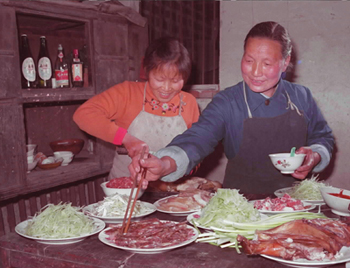| Tools: Save | Print | E-mail | Most Read |
| China Questions And Answers |
| Adjust font size: |
Q: In the 1950s, China adopted the "people's commune system" in its rural areas in a socialist campaign. However, it has been phased out since 1978 when rural reforms were implemented. Does this indicate that China no longer sticks to socialist road? A: Let's review experiences in history before answering this question. China was perennially haunted by the specter of starvation in the first half of the 20th Century. After the People's Republic of China was founded in 1949, the new government initiated an agrarian reform, abolishing feudal ownership of land and redistributing the land to individual farm households. The reform greatly boosted farmers' production enthusiasm and revitalized rural economy. Rapid development of agriculture and rising living standards of farmers prompted the country's leadership to launch another round of rural reform to realize public ownership of production materials, one of the cornerstone principles of socialism. Farmland, together with its management right, was taken away from farmers and put into State control. People's communes were established throughout the country to manage all agricultural production on behalf of the State in accordance with a national plan made annually by the central government in Beijing. Farmers were organized into small production teams, and teams into brigades, and brigades into communes. Members of each production team, the basic work unit, would start and finish each day's work together just like workers in a factory. Farmers above the age of 18 earned 10 work points each day and those under 18 got 8 to 9 points. Each individual farmer would get his payment, which was based on annual accumulation of his daily work points, usually at the end of each year, both in kind and in cash. As you can tell, there was little difference in farmers' income. Deprived of their decision-making powers and with little income difference, farmers gradually lost their work initiative, which resulted in a sharp decline in agricultural production across the nation. The situation became so catastrophic that the central government made the decision to abolish the people's commune system ad introduced the household contract responsibility system. While maintaining collective ownership of farmland, the new system contracts farmland to individual household and leaves farmers to decide what and how much they grow on their land. The success story of China's agriculture testifies to the correctness of the latest reforms. |
| Tools: Save | Print | E-mail | Most Read |
 |
| Related Stories |
|
Product Directory China Search |
Country Search Hot Buys |
